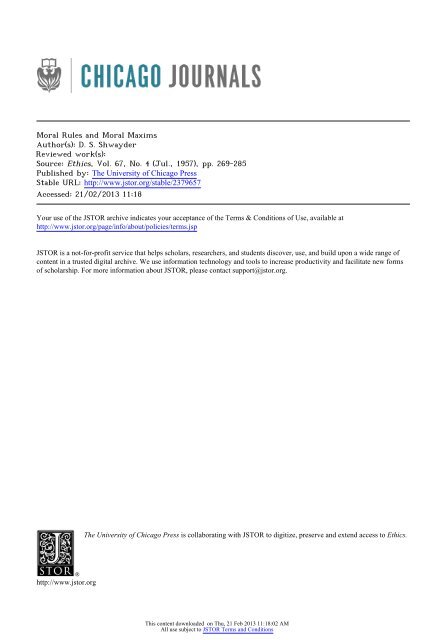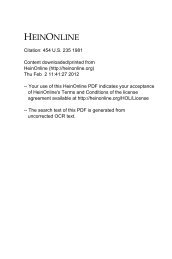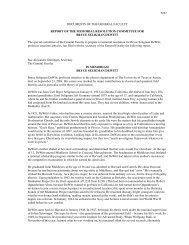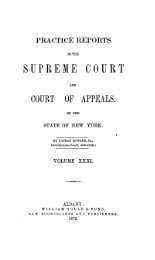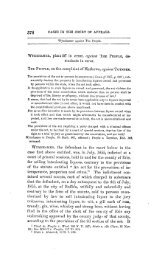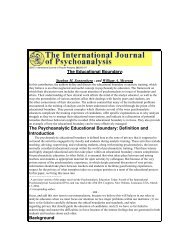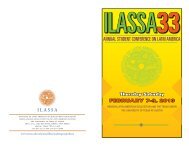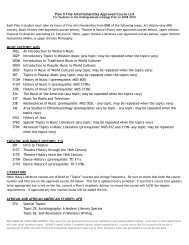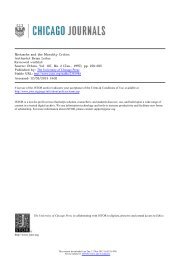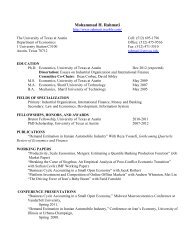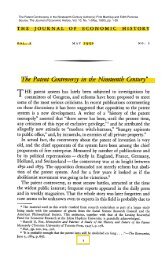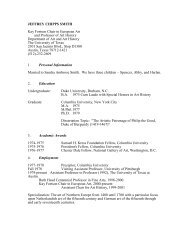Moral Rules and Moral Maxims - The University of Texas at Austin
Moral Rules and Moral Maxims - The University of Texas at Austin
Moral Rules and Moral Maxims - The University of Texas at Austin
You also want an ePaper? Increase the reach of your titles
YUMPU automatically turns print PDFs into web optimized ePapers that Google loves.
<strong>Moral</strong> <strong>Rules</strong> <strong>and</strong> <strong>Moral</strong> <strong>Maxims</strong>Author(s): D. S. ShwayderReviewed work(s):Source: Ethics, Vol. 67, No. 4 (Jul., 1957), pp. 269-285Published by: <strong>The</strong> <strong>University</strong> <strong>of</strong> Chicago PressStable URL: http://www.jstor.org/stable/2379657 .Accessed: 21/02/2013 11:18Your use <strong>of</strong> the JSTOR archive indic<strong>at</strong>es your acceptance <strong>of</strong> the Terms & Conditions <strong>of</strong> Use, available <strong>at</strong> .http://www.jstor.org/page/info/about/policies/terms.jsp.JSTOR is a not-for-pr<strong>of</strong>it service th<strong>at</strong> helps scholars, researchers, <strong>and</strong> students discover, use, <strong>and</strong> build upon a wide range <strong>of</strong>content in a trusted digital archive. We use inform<strong>at</strong>ion technology <strong>and</strong> tools to increase productivity <strong>and</strong> facilit<strong>at</strong>e new forms<strong>of</strong> scholarship. For more inform<strong>at</strong>ion about JSTOR, please contact support@jstor.org..<strong>The</strong> <strong>University</strong> <strong>of</strong> Chicago Press is collabor<strong>at</strong>ing with JSTOR to digitize, preserve <strong>and</strong> extend access to Ethics.http://www.jstor.orgThis content downloaded on Thu, 21 Feb 2013 11:18:02 AMAll use subject to JSTOR Terms <strong>and</strong> Conditions
MORAL RULES AND MORAL MAXIMS'D. S. SHWAYDERIRECENT efforts to elucid<strong>at</strong>e the~ character <strong>of</strong> moral reasoning havej\..given special importance to theidea <strong>of</strong> a rule. Toulmin, Baier, <strong>and</strong> Nowell-Smithmay, among others, be mentionedin this connection, as may recentcomment<strong>at</strong>ors on utilitarianism likeUrmson <strong>and</strong> Rawls. <strong>The</strong>se philosophersdiffer in important ways, but-<strong>at</strong> leastfor sake <strong>of</strong> argument-they all seem tohold to a theory which I call the doctrine<strong>of</strong> rules, <strong>and</strong> shall now try to paraphrase.To say th<strong>at</strong> an act is (morally) rightor th<strong>at</strong> (morally) one ought to do a certainact means th<strong>at</strong> the act would conformto an applicable (moral) rule.2 <strong>The</strong>st<strong>at</strong>ement th<strong>at</strong> the act is right is true if,in fact, the act would conform to the rule.It is not necessary th<strong>at</strong> the ruleachieve explicit formul<strong>at</strong>ion. It may simplybe customarily recognized <strong>and</strong> generallycomplied with, as are the rules forthe use <strong>of</strong> the word "the." However,whether or not explicitly laid down, it isnecessary to be able in most cases to saywhether or not the rule applies <strong>and</strong>, ifapplicable, whether or not an act conformsto it.It is extremely important to see th<strong>at</strong>the rule may or may not apply to a givencase. <strong>The</strong> rule does not apply itself, nordoes it carry any codicils circumscribingor otherwise governing its applic<strong>at</strong>ion.Whether or not the rule does apply is,however, something which can be decided;perhaps, indeed, by appeal to otherrules.<strong>Moral</strong> rules are <strong>of</strong> enormous variety,differing in respect <strong>of</strong> their rel<strong>at</strong>ive force,269the extent <strong>of</strong> their applic<strong>at</strong>ion, the kind<strong>of</strong> behavior they regul<strong>at</strong>e, their dependenceupon other rules, the importancethey have in the society where they apply,<strong>and</strong> other factors as well.Apart from such differences, moralrules, like all rules, betoken agreementsbetween intelligent animals. Holding tothe rule is holding to the agreement.<strong>The</strong> theory, even so schem<strong>at</strong>ically presented,is extremely captiv<strong>at</strong>ing becauseuseful, serving immedi<strong>at</strong>ely to clarify themoral use <strong>of</strong> the whole language <strong>of</strong>"right," "wrong," "ought." "Wrong"(say) is, in the first instance, used toteach rules by being applied to acts regardedas viol<strong>at</strong>ions; the language pointsto rules, <strong>and</strong> the rules emerge out <strong>of</strong> theuse <strong>of</strong> the language. L<strong>at</strong>er, when weknow the rule, we use "wrong" to st<strong>at</strong>eth<strong>at</strong> an act would be a viol<strong>at</strong>ion. <strong>The</strong>doctrine <strong>of</strong> rules is th<strong>at</strong> kind <strong>of</strong> theorywhich immedi<strong>at</strong>ely refreshes a murky <strong>at</strong>mosphere<strong>of</strong> smudged distinctions <strong>and</strong>enables us to bre<strong>at</strong>he more freely <strong>and</strong> seemore clearly.We see, for instance, how it is th<strong>at</strong> culturalrel<strong>at</strong>ivity <strong>and</strong> morality may, indeedmust reside side by side as neighbors.<strong>Rules</strong> apply within a given society, forthe society is composed precisely <strong>of</strong> thosewho hold bv the same moral rules. But,the rule determined <strong>and</strong> the applic<strong>at</strong>ionrecognized, it is a m<strong>at</strong>ter <strong>of</strong> objective factwhether or not the rule applies to a particularact <strong>and</strong>, if so, whether the act isright or wrong. It is a m<strong>at</strong>ter <strong>of</strong> cold factwhether this society has or has notadopted the practice <strong>of</strong> exposing blondchildren, <strong>and</strong> a m<strong>at</strong>ter <strong>of</strong> cold fact wheth-This content downloaded on Thu, 21 Feb 2013 11:18:02 AMAll use subject to JSTOR Terms <strong>and</strong> Conditions
270 ETHICSer this is a blond child; it is, therefore, am<strong>at</strong>ter <strong>of</strong> cold fact whether this childought to be exposed.This makes clear why morals must be"social." For agreements are agreementsbetween men, governing their mutualbehavior.<strong>The</strong> theory <strong>of</strong>fers us some hope <strong>of</strong> sayingwh<strong>at</strong> the r<strong>at</strong>ionale <strong>of</strong> a moral rule is,<strong>and</strong> this turns out to be something socialin a more delimited sense.<strong>The</strong> doctrine puts us in a position toappreci<strong>at</strong>e the importance <strong>of</strong> havingmoral rules <strong>and</strong> thereby clears the wayfor specifying criteria for resolving thevexed question <strong>of</strong> ascertaining the rel<strong>at</strong>ivemerits <strong>of</strong> different rules, <strong>and</strong> so providinga test for deciding whether <strong>and</strong>how we should modify such <strong>and</strong> suchpractices. We do this by exploiting thedistinction, as it is sometimes called,between legisl<strong>at</strong>or <strong>and</strong> judge; betweenthe promulg<strong>at</strong>ion or enactment <strong>of</strong> rules<strong>and</strong> the utilizing <strong>of</strong> the rules to appraisebehavior as right or wrong. We can now<strong>at</strong> last clearly appreci<strong>at</strong>e the complementarycharacter <strong>of</strong> teleological <strong>and</strong> deontologicalethics, <strong>and</strong> thus gain a renewed<strong>and</strong> less haphazard appreci<strong>at</strong>ion <strong>of</strong> each.Not the least advantage <strong>of</strong> this theory isth<strong>at</strong> it permits us with good conscience<strong>and</strong> little loss to allow "objective" <strong>and</strong>"subjective" to slide into the desuetudethey deserve; for we can now see in wh<strong>at</strong>manner compliance with rules is both"objective" <strong>and</strong> "subjective" <strong>and</strong> howuseless this way <strong>of</strong> putting it is.In short, we gain a fresh <strong>and</strong> broadview <strong>of</strong> nearly the whole <strong>of</strong> moral philosophy,seeing how the various keyproblems <strong>and</strong> concepts rel<strong>at</strong>e to one another;<strong>and</strong> the field once again appearsreasonable, even reasonably tidy.II<strong>The</strong> <strong>at</strong>mosphere does not, however, remainso clear <strong>and</strong> clean, for the doctrine<strong>of</strong> rules bears its own nascent obscuritieswhich grow large <strong>and</strong> soon loom allaround.A major advantage <strong>of</strong> the theory isth<strong>at</strong> it permits us to apply to problems<strong>of</strong> moral philosophy more general <strong>and</strong>readily grasped facts about the concept<strong>of</strong> a rule. But this advantage carries thecoll<strong>at</strong>eral responsibility <strong>of</strong> distinguishingclearly between moral rules <strong>and</strong> others.This is no easy task <strong>and</strong> perhaps an impossibleone.3We speak <strong>of</strong> rules in many differentconnections. We have club rules <strong>and</strong>rules for games; formal rules such asthose <strong>of</strong> arithmetic; religious <strong>and</strong> ceremonialrules; rules <strong>of</strong> etiquette <strong>and</strong> rulesfor parliamentary procedure, laws in thelegal sense <strong>and</strong> rules <strong>of</strong> language. Indeed,it would be a mistake to suppose th<strong>at</strong>these are all in themselves unified ideas,as Wittgenstein's illustr<strong>at</strong>ive examin<strong>at</strong>ions<strong>of</strong> "game" <strong>and</strong> the idea <strong>of</strong> language,<strong>and</strong> Hart's examin<strong>at</strong>ion <strong>of</strong> legal argument,show. But these different kinds <strong>of</strong>rule must all be distinguished from moralrules, if there be such.<strong>The</strong> <strong>at</strong>tempt to harden <strong>and</strong> elabor<strong>at</strong>ethe peculiar character <strong>of</strong> moral rules carriesin train a series <strong>of</strong> interconnectedembarrassments for the doctrine <strong>of</strong>rules. For, after saying th<strong>at</strong> moral rulesare not like rules <strong>of</strong> this <strong>and</strong> th<strong>at</strong> in these<strong>and</strong> those ways, there seems little left <strong>of</strong>the rule conception <strong>of</strong> morality.I shall now briefly adumbr<strong>at</strong>e some <strong>of</strong>the difficulties, without trying to settlethem, or even hoping th<strong>at</strong> I could, forthey give me abundant reason to thinkth<strong>at</strong> morality wants something otherthan the pure doctrine <strong>of</strong> rules.<strong>The</strong> first distinguishing fact aboutmoral rules is their vast sway in severaldirections. First, particular rules do nothold just for a certain segment <strong>of</strong> society;save for certain special exceptionswhichmust be exceptions-they hold forThis content downloaded on Thu, 21 Feb 2013 11:18:02 AMAll use subject to JSTOR Terms <strong>and</strong> Conditions
everyone. Second, the oblig<strong>at</strong>ions engendered,if there are such, are ones, savefor special exceptions, we owe to everyonebelonging to the society. Third, almostany aspect <strong>of</strong> our behavior mightbe subject to moral regul<strong>at</strong>ion. Moreover,failure to comply with rules <strong>of</strong> anyother kind might involve moral dereliction,if deliber<strong>at</strong>e, say. Thus deliber<strong>at</strong>ebreach <strong>of</strong> the rules <strong>of</strong> a club, or the law,or a game, or etiquette may constitute abreach <strong>of</strong> the moral rules <strong>of</strong> holding tocovenants made, or acting decently.<strong>The</strong>se observ<strong>at</strong>ions connect obviouslywith our reluctance to allow for specialmoral expertise <strong>and</strong> competence <strong>and</strong> alsowith the difficulty <strong>of</strong> finding anythingcomparable to conscience bearing onother than moral rules. <strong>The</strong>re are no expertsbecause morality affects everyone,<strong>and</strong> may affect any mode <strong>of</strong> behavior.Conscience is pricked only when oneknowingly does wrong, <strong>and</strong> th<strong>at</strong> willnearly always count as morally wrongbehavior.It is occasionally useful to compare asociety to a large club <strong>and</strong> to suggest th<strong>at</strong>club rules <strong>and</strong> moral rules differ only indegree. But the difference is simply notone <strong>of</strong> degree, partly for the reasons indic<strong>at</strong>ed-moralitywants no special competence,<strong>and</strong> breaches <strong>of</strong> club rules disturbconscience only by being alsobreaches <strong>of</strong> moral rules-but there areother reasons too, some to be noticed below.In any case, one would think th<strong>at</strong>the proper counterpart to club rules inthe social sphere would be, if anything,rules <strong>of</strong> law. But even here we should beware<strong>of</strong> pushing the analogy between aclub <strong>and</strong> society too far.Next, it is extremely hard to say inwh<strong>at</strong> manner moral rules betoken agreements.While moral practices wouldseem to be conventional, if anything is,it is quite impossible to say who convened<strong>and</strong> to wh<strong>at</strong> end. This more thanMORAL RULES AND MORAL MAXIMS 271anything makes suspicious the contracttheory <strong>of</strong> morality. One is even temptedto say th<strong>at</strong> moral rules characteristicallypresume no agreements, which would behelpful except for undercutting the wholeconcept <strong>of</strong> rule.It is a pl<strong>at</strong>itude to say th<strong>at</strong> we do not,for the most part, agree to accept themoral practices <strong>of</strong> our society; we aresimply taught them. <strong>The</strong>re is, for themost part, no question <strong>of</strong> accepting therules-<strong>of</strong> agreeing. Occasionally one doestake it upon himself to reject some practice<strong>of</strong> his society. He must then sufferthe consequences or leave. But these consequencesare <strong>of</strong> curiously undetermined<strong>and</strong> unspecified kind. In the first place,our would-be reformer or objector did notbargain for the particular unpleasantrieshe received; <strong>and</strong> he was committed tosuffer them-wh<strong>at</strong>ever they turned outto be-before acquiescing in any agreement,Moreover, one cannot alwaysleave, as recent experience shows. Inshort, one's options are cut to a minimum.But, on the other side, he may suffernothing especially unpleasant <strong>and</strong>may even succeed in altering the moralrules <strong>of</strong> his society. This raises the embarrassingquestion <strong>of</strong> accounting for <strong>and</strong>justifying modific<strong>at</strong>ions in the moralcode, the problem which so vexedHobbes's philosophy. A modific<strong>at</strong>ionwould seem to be the replacement <strong>of</strong> onerule with another, which we do by makingnew agreements, perhaps within astructure, accepted by all, allowing forsuch modific<strong>at</strong>ions. But the near impossibility<strong>of</strong> specifying the moral rules <strong>and</strong>placing the agreements makes this storyalmost worthless. Which rule replaceswhich <strong>and</strong> by wh<strong>at</strong> mechanism? Even ifwe can make sense <strong>of</strong> rules without agree-ment, by summoning accomplishedchanges <strong>of</strong> social practice, these changeswill always inevitably involve the viol<strong>at</strong>ion<strong>of</strong> existing rules <strong>and</strong> so wrong action.This content downloaded on Thu, 21 Feb 2013 11:18:02 AMAll use subject to JSTOR Terms <strong>and</strong> Conditions
272 ETHICSAlter<strong>at</strong>ions in the moral code will, then,always be wrong, which seems curious.We are, most probably, soon forced backon a descriptive account telling <strong>of</strong> socialmobility <strong>and</strong> partition <strong>and</strong> the interaction<strong>of</strong> different groups <strong>and</strong> subgroups.We might thus get quite excellent descriptions,even explan<strong>at</strong>ions, <strong>of</strong> why thissociety has th<strong>at</strong> rule; but it does not yetassure us <strong>of</strong> a rule.It is interesting too th<strong>at</strong>, where it isrelevant to inquire after the reason foradopting rules, it is generally possible toprovide fairly specific answers. For instance,the rules governing parliamentarydiscussion can be argued on grounds <strong>of</strong>how far they facilit<strong>at</strong>e deb<strong>at</strong>e <strong>and</strong> lead itto s<strong>at</strong>isfactory termin<strong>at</strong>ion. But it ishard to cite similar reasons for adoptingmoral rules. Generally we fall back onformulas involving terms like "welfare,"which are as much in question as therule. But these formulas have their point<strong>and</strong>, as I shall try to show, it is no accidentth<strong>at</strong> we should so <strong>of</strong>ten return tothem in discussing moral questions <strong>and</strong>moral philosophy.Does not everything I have been sayinghold equally for rules <strong>of</strong> law? Onedoes not, after all, agree to the law <strong>of</strong> thel<strong>and</strong>, a fact no pledge <strong>of</strong> allegiance canalter. Nor is one always able to quit apolitical club, <strong>and</strong> join another, or none<strong>at</strong> all. One does wh<strong>at</strong> he ought or suffersthe consequences.Yes, there are important parallels,<strong>of</strong>ten lost together in the concomitantgeneral assimil<strong>at</strong>ion <strong>of</strong> rules <strong>of</strong> law <strong>and</strong>moral rules to something else not clearlyspecified. But there are important differencestoo. In the first place, there is nopuzzle about changing the law, for herewe may consult the action <strong>of</strong> competentauthority. Nor, indeed, is there a realproblem over consequences, for the lawprescribes specific sanctions, where theconsequences <strong>of</strong> immoral action are solittle specific as hardly to deserve the title<strong>of</strong> "sanction." Society <strong>of</strong>ten has recourseto law just where the consequences <strong>of</strong>alleged immoral behavior are so little respectedas to render the supposed rule inoper<strong>at</strong>ive.Many areas <strong>of</strong> law, ideallyconceived, are adjuncts to morality; <strong>and</strong>an ideal morality perhaps could dispensewith those areas <strong>of</strong> law. It may be th<strong>at</strong>the acceptance <strong>of</strong> law in a general sensemay be as difficult to clarify as is the acceptance<strong>of</strong> morality, for in both casesthere is little scope for "acceptance." Butthe law is, in any case, the adjunct; it ismuch more "positive" <strong>and</strong> specific <strong>and</strong>circumscribed <strong>and</strong> system<strong>at</strong>ic in its oper<strong>at</strong>ions.Particular laws, unlike particularmoral rules, may eman<strong>at</strong>e from <strong>and</strong> berescinded in due process by due authorities,where only duly constituted authoritiesdecide the law. <strong>The</strong>re is nothing oddabout legisl<strong>at</strong>ive <strong>and</strong> judicial expertise<strong>and</strong> authority; while moral expertise <strong>and</strong>authority are suspicious, to say the least.<strong>The</strong>se facts tie up with the further factth<strong>at</strong>, while legal responsibility may beascribed by competent authority toothers on the basis <strong>of</strong> wh<strong>at</strong> they havedone, we exercise moral reasoning also todecide for ourselves wh<strong>at</strong> we ought to do.When we reason on the legality <strong>of</strong> actionscontempl<strong>at</strong>ed but not done, the questionconverts itself into one <strong>of</strong> interest ("CanI be<strong>at</strong> the law?") or morality ("Is itwrong to break the law here?"). Beingpurely appraisive, legal reasoning is lesscomplic<strong>at</strong>ed than moral reasoning. Further,the law is primarily interested todetermine whether acts are wrong or notwrong, in the legal sense. <strong>The</strong>re is littleroom to declare acts "right." But sinceone must decide for himself, <strong>and</strong> <strong>of</strong>tenwants to do wh<strong>at</strong> is right, there is abundantscope for such moral questions. Anotherimportant difference is th<strong>at</strong> legalThis content downloaded on Thu, 21 Feb 2013 11:18:02 AMAll use subject to JSTOR Terms <strong>and</strong> Conditions
questions are usually finally decidable ina finite <strong>and</strong> specifiable number <strong>of</strong> steps.Judgment is given <strong>and</strong>, after a smallnumber <strong>of</strong> appeals <strong>and</strong> reviews, the caseis finally decided or ab<strong>and</strong>oned. One is declaredguilty or responsible. But moralquestions are much more open-ended,<strong>and</strong> possibly may be pursued downthrough the ages.Clearly, one <strong>of</strong> the cruxes is sanctions.<strong>The</strong> specific<strong>at</strong>ion <strong>of</strong> wh<strong>at</strong> is peculiar inmoral sanctions would, I suspect, morethan anything else serve to determine thecharacter <strong>of</strong> moral rules. Were we toknow when, in wh<strong>at</strong> manner, <strong>and</strong> to wh<strong>at</strong>end sanctions were enjoined, we shouldknow a gre<strong>at</strong> deal about wh<strong>at</strong> constitutesbreaches <strong>of</strong> the rules, <strong>and</strong> so the character<strong>of</strong> the rules. But, as noted, one thingpeculiar to moral rules is just the absence<strong>of</strong> specific penalties. When webreak a club rule a fine may be assessedor membership suspended; breaking therules <strong>of</strong> a game may cause us to forfeit orto suffer specific compens<strong>at</strong>ing disadvantages;when we break the law we are liableto fine or incarcer<strong>at</strong>ion. <strong>The</strong> sanctionsare all internal to the enactment <strong>of</strong>the rule: Unless you do such <strong>and</strong> such,you will suffer such <strong>and</strong> such penalty.But the sanctions for breach <strong>of</strong> moralityare either entirely external <strong>and</strong> unspecifiedor, in the case <strong>of</strong> a conscientiousindividual, moral reward <strong>and</strong> punishment"must lie in the action itself."It is interesting th<strong>at</strong> <strong>at</strong>taching specificsanctions to moral rules, as applied tothose <strong>of</strong> responsible age, almost autom<strong>at</strong>icallyconverts them into rules <strong>of</strong> lawor rules <strong>of</strong> religion, or the like. By judicialprocess or overt legisl<strong>at</strong>ion, for example,we transl<strong>at</strong>e the moral sentiments<strong>of</strong> society into public declar<strong>at</strong>ions, yieldingrules <strong>of</strong> law.Now, I have been speaking r<strong>at</strong>her freely<strong>of</strong> the consequences <strong>of</strong> breaking moralMORAL RULES AND MORAL MAXIMS 273rules, but suspect it is metaphorical to callthese sanctions. <strong>The</strong>se consequences consultonly the vicarious <strong>and</strong> unpredictableaction <strong>of</strong> "public opinion." One sufficientlysteeled against "moral pressure"<strong>and</strong> inured to hard scowls <strong>and</strong> gossipneed not fear these consequences, or may<strong>at</strong> worst need to put up with small inconveniences.Indeed, the self-righteous arenot only steeled, inured, <strong>and</strong> willing, but<strong>of</strong>ten downright eager to suffer such consequences.<strong>The</strong> most effective penaltiesare curiously subjective-pangs <strong>of</strong> remorse<strong>and</strong> the like-<strong>and</strong> may be totallyabsent. Observe, in any case, th<strong>at</strong> thesanctions, if sanctions, are not specific tothe act, but always, so to speak, generic.<strong>The</strong> same sanction, so far as we can describeit, <strong>at</strong>taches to every breach <strong>of</strong>morality. <strong>The</strong>se are the sanctions (ifsanctions) <strong>of</strong> conscience <strong>and</strong> publicopinion.My remarks, <strong>of</strong> course, have nothingto do with how we are taught to differenti<strong>at</strong>ebetween right <strong>and</strong> wrong. We generallyare taught this by being constrainedto act in certain ways by prearranged<strong>and</strong> specific people who awardprest<strong>at</strong>ed <strong>and</strong> specific penalties. But,once one is free from such constraint, thesanctions are no longer present.<strong>The</strong>re are additional difficulties <strong>of</strong> asimilar kind for the doctrine <strong>of</strong> moralrules, especially when it comes to seeingexactly how it is to be used to elucid<strong>at</strong>emoral conflict <strong>and</strong> our appraisals <strong>of</strong> thebehavior <strong>of</strong> agents living in other societies.But enough has been said to showth<strong>at</strong> the doctrine, if it leads anywhere, isno high road to clarity, but a twisted,narrow p<strong>at</strong>h.It is remarkable th<strong>at</strong> moral rules, if wemay speak <strong>of</strong> them so blithely, seldomgain explicit formul<strong>at</strong>ion. We can nowbegin to see why th<strong>at</strong> is so. <strong>The</strong> momentwe trap a moral practice in a prescrip-This content downloaded on Thu, 21 Feb 2013 11:18:02 AMAll use subject to JSTOR Terms <strong>and</strong> Conditions
274 ETHICStion, we are almost bound to specifysanction <strong>and</strong> clarify the applic<strong>at</strong>ion. <strong>The</strong>result is usually either a law <strong>of</strong> the l<strong>and</strong>or a law <strong>of</strong> the church or something comparable.Because they are generally unformul<strong>at</strong>ed,it is hard to loc<strong>at</strong>e good examples<strong>of</strong> moral rules, itself cause for suspicion.Of course, we can describe the moralpractice <strong>of</strong> societies, our own <strong>and</strong> others;<strong>and</strong>, though rarely done, it is not impossibleto transfer these st<strong>at</strong>ements intoexplicit rules <strong>of</strong> behavior.<strong>Moral</strong> rules, expressly formul<strong>at</strong>ed,would have to meet certain requirements.First, it is <strong>of</strong> the n<strong>at</strong>ure <strong>of</strong> a moral ruleth<strong>at</strong> it might have been otherwise, in thesense in which, while one society mightadopt the practice, another might not.This is the one way in which moral rulesare arbitrary. Second, a moral rule mustbe backed, not by specific sanctions, butby "public opinion."When we look <strong>at</strong> examples <strong>of</strong>ten cited<strong>of</strong> moral rules we discover th<strong>at</strong> these requirementsare usually not met. A commonexample is the alleged rule againstmurder. In the first place, one usually hasin mind a law r<strong>at</strong>her than a moral ruleagainst murder. But, apart from th<strong>at</strong>,the principle would still fail to meet thesecond requirement for being a moralrule. <strong>The</strong> proscription <strong>of</strong> murder is notpeculiar to this or th<strong>at</strong> society; after all,murder is immoral (or illegal) killing.Wh<strong>at</strong> will be peculiar to this or th<strong>at</strong>society is the specific<strong>at</strong>ion <strong>of</strong> wh<strong>at</strong> willcount as murder. <strong>The</strong> moral reformerwould hardly suggest we ab<strong>and</strong>on therule against murder, though he mightrecommend specific alter<strong>at</strong>ions in wh<strong>at</strong>should count as, wh<strong>at</strong> we should call,murder. I shall call such pronouncementsas "Do not murder" <strong>and</strong> "Keep promises"moral maxims, <strong>and</strong> shall suggestth<strong>at</strong> the moral practice <strong>of</strong> a society is tobe understood largely as the manner inwhich members apply moral maxims.Whether or not wh<strong>at</strong> we apply be maxims,the idea <strong>of</strong> applic<strong>at</strong>ion remains central.Baier observed th<strong>at</strong> moral rules requireprinciples <strong>of</strong> differenti<strong>at</strong>ion <strong>and</strong>priority <strong>and</strong> ways <strong>of</strong> determining exemptions<strong>and</strong> exceptions. <strong>The</strong>se wouldseem to me to count as principles <strong>of</strong> applic<strong>at</strong>ionfor moral rules. Now, one isapt, as he looks <strong>at</strong> these rules <strong>of</strong> applic<strong>at</strong>ion,to come more <strong>and</strong> more to see themas the moral rules, which even Baierseems to suggest could be the case (op.cit., pp. 132 f.).Of course, all rules which are used areapplied. But rules such as those for arithmeticcan be distinguished from <strong>and</strong> consideredapart from the rule or manner <strong>of</strong>their applic<strong>at</strong>ion. But other rules seem tobe nothing more than rules <strong>of</strong> applic<strong>at</strong>ion-rules <strong>of</strong> language <strong>and</strong> (as I suggest)rules <strong>of</strong> morality. However, this way <strong>of</strong>putting it is a puzzling <strong>and</strong> misleadingresult <strong>of</strong> a too narrow devotion to thedoctrine <strong>of</strong> rules, which impels us towonder wh<strong>at</strong> it is we apply. We mightless misleadingly say th<strong>at</strong> moral rules arerules in applic<strong>at</strong>ion. Being rules <strong>of</strong> behavior,they cannot be severed as a calculusfrom the behavior they govern.This is the last (not uniquely) distinguishingfe<strong>at</strong>ure <strong>of</strong> moral rules I want toremark-th<strong>at</strong> they inevitably dem<strong>and</strong>coll<strong>at</strong>eral rules <strong>of</strong> applic<strong>at</strong>ion, or are bestregarded as rules in applic<strong>at</strong>ion. Whicheverway we put it, the manner <strong>and</strong> conditions<strong>of</strong> "applic<strong>at</strong>ion" are heterogeneousin the extreme, not subject to simple <strong>and</strong>specific advance summing up. And tospeak <strong>of</strong> rules <strong>at</strong> all is likely, in Hart'sphrase, to impose a "spurious unity."IIIAs st<strong>at</strong>ed, I shall call principles like"It is wrong to murder," or "One oughtThis content downloaded on Thu, 21 Feb 2013 11:18:02 AMAll use subject to JSTOR Terms <strong>and</strong> Conditions
always to keep promises," moral maxims,<strong>and</strong> shall distinguish these sharplyfrom moral rules.I shall use "moral maxim" in a broader<strong>and</strong> a narrower way. In the broader sensea maxim is a pronouncement serving toindic<strong>at</strong>e wh<strong>at</strong> it is to be moral. Besidesexamples cited, maxims, in the broadsense, will include principles <strong>of</strong> impartiality,universality, <strong>and</strong> the like. Learningthe very language <strong>of</strong> "right" <strong>and</strong>"wrong" is conjug<strong>at</strong>e with learning maxims.Functioning as they do, maximswant no moral justific<strong>at</strong>ion, for they setthe boundaries <strong>of</strong> moral justific<strong>at</strong>ion.<strong>The</strong>y are, as we say, a priori; they are,broadly conceived, logical principles. Weestabish them by exhibiting in detailwh<strong>at</strong> morality is, i.e., in wh<strong>at</strong> manner weemploy wh<strong>at</strong> we all recognize to be thelanguage <strong>of</strong> morals."Maxim," in this broad sense, doesnot tie up a ne<strong>at</strong> bundle, the principlessubsumed thereunder being multiform inthe extreme. <strong>Maxims</strong> may be used tomark purely formal rel<strong>at</strong>ionships ("Wh<strong>at</strong>is wrong is not right"); or more complic<strong>at</strong>edrel<strong>at</strong>ions between the concepts <strong>of</strong>morality (" 'Ought' implies 'Can' ";"One should be punished only when responsible");the rel<strong>at</strong>ions <strong>of</strong> reason toaction ("Do wh<strong>at</strong> is right"); or the relevance<strong>of</strong> reasoning in certain ways (principles<strong>of</strong> impartiality); the r<strong>at</strong>ionale <strong>of</strong>morality (the principle <strong>of</strong> utility); thepoint <strong>of</strong> the language <strong>of</strong> morals (to bringone to act or to forbear); the point <strong>of</strong>view <strong>of</strong> morality (the C<strong>at</strong>egorical Imper<strong>at</strong>ive<strong>and</strong> principles <strong>of</strong> equity).All <strong>of</strong> these have been construed <strong>and</strong>misconstrued as moral rules. Like rules,they are <strong>of</strong>ten formul<strong>at</strong>ed in the language<strong>of</strong> "right" <strong>and</strong> "wrong," "do" <strong>and</strong>"don't." But, found in maxims, thesewords do not tell us wh<strong>at</strong> is right <strong>and</strong>wrong, wh<strong>at</strong> we ought or ought not toMORAL RULES AND MORAL MAXIMS 275do; r<strong>at</strong>her they signal rel<strong>at</strong>ionships (forexample) between saying th<strong>at</strong> somethingis right <strong>and</strong> saying we ought to do it.It is tempting <strong>and</strong> common enough tojustify one's awareness <strong>of</strong> maxims by anappeal to "intuition," <strong>and</strong> to docket theinform<strong>at</strong>ion thus garnered as synthetic apriori. <strong>The</strong>se principles are, so it has beensaid, the moral ultim<strong>at</strong>es, so fundamentalas to elude justific<strong>at</strong>ion; they arewh<strong>at</strong> we cannot help but recognize inmorality; yet they say something, <strong>and</strong>are clearly not analytic. <strong>The</strong>se moves allhave their point, but are still misleadingjust because they tend to misplace st<strong>at</strong>ementsabout morals as moral st<strong>at</strong>ements.<strong>The</strong>re is no call to do this once we clearlysee th<strong>at</strong> the concept <strong>of</strong> morality is lacedup out <strong>of</strong> many str<strong>and</strong>s-reason, action,choice, desert, <strong>and</strong> the like-<strong>and</strong> it iseasy enough to get the criss-crossingswrong; to talk falsely as well as trulyabout morality. But this is still quite anotherthing than talking truly or falselyabout the rightness <strong>of</strong> particular acts, orclasses <strong>of</strong> particular acts. Within moralitymaxims function as formulas-logicalprinciples-pointing the relevance <strong>of</strong> certainconsider<strong>at</strong>ions. As st<strong>at</strong>ements, theyalways apply to moral discourse, tomorality. <strong>The</strong>re is no need to confusethese roles, to misplace maxims as deliverances<strong>of</strong> intuition <strong>and</strong> to appeal tosynthetic a priori knowledge, if only wedo remain clear on this difference betweenmoral st<strong>at</strong>ements <strong>and</strong> moral formulas<strong>and</strong> recognize how we alter ourposition by converting formulas intost<strong>at</strong>ements. In no case are maxims ultim<strong>at</strong>emoral axioms from which all othermoral rules may be drawn.Wh<strong>at</strong> interests me most in this paperare maxims in a narrower sense, principlessuch as "Keep promises," whichallude to a fairly specific mode <strong>of</strong> action.It will be obvious th<strong>at</strong> I have these pri-This content downloaded on Thu, 21 Feb 2013 11:18:02 AMAll use subject to JSTOR Terms <strong>and</strong> Conditions
276 ETHICSmarily in mind when speaking <strong>of</strong> "maxims."<strong>The</strong>se really are maxims, whosechief function is to delimit an area <strong>of</strong> humanbehavior as susceptible to moralappraisal <strong>and</strong> regul<strong>at</strong>ion. Working in thisway, they do not prescribe or proscribeparticular actions in particular circumstances,as do moral rules. <strong>The</strong>re can beno moral questions whether we ought orought not to murder, as there can be agenuine <strong>and</strong> difficult moral question overwhether this or th<strong>at</strong> is a case <strong>of</strong> murder.<strong>The</strong> heart <strong>of</strong> the maxim is wh<strong>at</strong> Nowell-Smith calls a "gerundive word." <strong>The</strong>sewords are designed to place instances <strong>of</strong>a specifiable kind <strong>of</strong> behavior as morallydesirable or undesirable. <strong>The</strong> maxim,then, simply reiter<strong>at</strong>es, but with somedirection: we ought (or ought not) to dothose actions <strong>of</strong> this kind which we oughttor ought not) to do.While they do not prescribe or proscribeaction, maxims do play a role inmoral discourse, serving as formulas delimitingmoral questions. For the moment,it makes little difference whetherwe are deciding upon, appraising, or simplyclassifying actions as morally right orwrong. Indeed, we might better see howmaxims fit into moral discourse by noticinghow they might be employed by acultural spect<strong>at</strong>or.How is it th<strong>at</strong> an anthropologistknows wh<strong>at</strong> to investig<strong>at</strong>e when he setsout to learn something <strong>of</strong> the moral customs<strong>of</strong> a tribe? How does he formul<strong>at</strong>ehis results? After all, he turns up suchenormous differences.Perhaps he asks himself such questionsas, "Wh<strong>at</strong> counts as murder here?"; th<strong>at</strong>is, wh<strong>at</strong> kinds <strong>of</strong> killing are subject tomoral disapproval? Or he might inquirewh<strong>at</strong> customs regul<strong>at</strong>e sexual behavior,<strong>and</strong> will then tell us th<strong>at</strong> such <strong>and</strong> suchpractices are accounted promiscuous.This shows how maxims may figure in theformul<strong>at</strong>ion <strong>of</strong> questions <strong>and</strong> answers.<strong>The</strong> maxim says, "Do no immoral action<strong>of</strong> a certain kind"; <strong>and</strong> the question is,"When is this kind <strong>of</strong> action immoral?"In principle, any mode <strong>of</strong> human behaviorwhich affects others living infairly close <strong>and</strong> continual proximity issubject to moral regul<strong>at</strong>ion. <strong>The</strong> modes<strong>of</strong> behavior generally subject to moralregul<strong>at</strong>ion, thus earning an interculturalmaxim, will perhaps depend upon man's"n<strong>at</strong>ure" as a consuming, competing, socializingcre<strong>at</strong>ure, with a long childhood.I suspect th<strong>at</strong> these "facts" are inextricablybuilt into our conceptions <strong>of</strong>"man" <strong>and</strong> "society." For instance, it ishard to think wh<strong>at</strong> a human society withoutlanguage could be <strong>and</strong>, man <strong>and</strong> languagebeing wh<strong>at</strong> they are, hard to imaginea society without some idea <strong>of</strong> thedeceitful use <strong>of</strong> language. However th<strong>at</strong>may be, wh<strong>at</strong>ever the "n<strong>at</strong>ural found<strong>at</strong>ion<strong>of</strong> morality," certain areas <strong>of</strong> humanbehavior will invariably be subject tomoral regul<strong>at</strong>ion, <strong>and</strong> these may bepointed by maxims.It is important, <strong>of</strong> course, th<strong>at</strong> maximsusually work in one direction only. Thus,it is wrong to murder <strong>and</strong> right to keeppromises. <strong>Maxims</strong> allude to actionswhich human beings do have some tendencyto do or not to do, with results normallyunfortun<strong>at</strong>e or unpleasant toothers. Killing, damaging, or failing tokeep a promise to another would generallybe regarded as unfortun<strong>at</strong>e by him;facts, I think, also built into our concepts<strong>of</strong> "kill," "damage," "promise."Anthropologists' discoveries are occasionallysurprising for showing th<strong>at</strong> in acertain society a certain kind <strong>of</strong> behavioris or is not subject to moral regul<strong>at</strong>ion.We cannot expect th<strong>at</strong> all our maximswill apply in all societies. It is barely conceivable,for instance, th<strong>at</strong> certain groupsare without the institution <strong>of</strong> promise-This content downloaded on Thu, 21 Feb 2013 11:18:02 AMAll use subject to JSTOR Terms <strong>and</strong> Conditions
making. <strong>The</strong> maxim "keep promises"would mean nothing to them. But weshould certainly expect th<strong>at</strong> whereverpromises are made, they ought to be kept-th<strong>at</strong> is a logical, a necessary factthoughwh<strong>at</strong> will count as not keeping apromise will vary. <strong>Maxims</strong>, <strong>and</strong> not thepractice, are universal <strong>and</strong> transcultural,only because maxims reiter<strong>at</strong>e, in a localizedway, th<strong>at</strong> wh<strong>at</strong> is wrong is wrong.<strong>The</strong> role <strong>of</strong> maxims in the h<strong>and</strong>s <strong>of</strong>moral agents <strong>and</strong> appraisers is similar totheir role in the h<strong>and</strong>s <strong>of</strong> a cultural spect<strong>at</strong>or,but <strong>at</strong> once simpler <strong>and</strong> more interesting.Simpler, because the agent or appraiseroper<strong>at</strong>es within a society <strong>and</strong>need not bother with whether a maximdoes or does not apply. More interesting,because maxims will, for agent <strong>and</strong> appraiser,enter into the very teaching <strong>of</strong>the difference between right <strong>and</strong> wrong<strong>and</strong> a mastery <strong>of</strong> those concepts, into theexplicit deciding <strong>and</strong> appraising <strong>of</strong> action,<strong>and</strong> also will play roles in modifyingcurrent moral practice.Let us consider schem<strong>at</strong>ically howthese different tasks are discharged.Suppose we must decide upon or evalu<strong>at</strong>ea line <strong>of</strong> action clearly involving amoral issue. It would be n<strong>at</strong>ural to formul<strong>at</strong>ethe conclusion in terms <strong>of</strong> whetheror not the act would, say, involve unnecessarysuffering. Or, perhaps it is am<strong>at</strong>ter <strong>of</strong> resolving a conflict, <strong>and</strong> thiswill <strong>of</strong>ten take the form <strong>of</strong> adjudic<strong>at</strong>ingthe claims <strong>of</strong> maxims which in the case<strong>at</strong> issue happen to compete; we mightsay th<strong>at</strong> an act was not really theft, forthe agent was bound by loyalty to carrythrough with the deed.We use maxims to draw an agent's <strong>at</strong>tentionto the fact th<strong>at</strong> his contempl<strong>at</strong>edaction does involve moral issues, towhich he is either oblivious or callous.We might say, "But th<strong>at</strong> would be dishonest,"which a moment's reflectionMORAL RULES AND MORAL MAXIMS 277shows it to be, <strong>and</strong> we thereby impressupon him th<strong>at</strong> something more than apr<strong>of</strong>it is <strong>at</strong> issue, <strong>and</strong> perhaps we mightsucceed in persuading him to the side <strong>of</strong>virtue.Serious moral reformers <strong>of</strong>ten frametheir proposals within the rubrics <strong>of</strong>familiar maxims. <strong>The</strong>y might, for instance,say th<strong>at</strong> capital punishment ismurder; or th<strong>at</strong> euthanasia is not murderbut the relief <strong>of</strong> unnecessary pain. <strong>Moral</strong>practices are altered by a progressivemodific<strong>at</strong>ion <strong>of</strong> wh<strong>at</strong> is deemed murder,adultery, etc., i.e., as wh<strong>at</strong> counts as immoralkilling, sexual practice, or the like.As we shall l<strong>at</strong>er see, this progress willgenerally be by way <strong>of</strong> a series <strong>of</strong> precedentspointing wh<strong>at</strong> is to be regarded asmorally right or wrong.4Consider how we might teach a childthe difference between right <strong>and</strong> wrong,<strong>and</strong> wh<strong>at</strong> kind <strong>of</strong> difference this is. Witha disapproving tone <strong>of</strong> voice, <strong>at</strong>tendedperhaps with a slap on the bottom, wetell the child th<strong>at</strong> it is wrong to take wh<strong>at</strong>is not his, <strong>at</strong> the same time saying th<strong>at</strong> heshould not steal; <strong>and</strong> we add reason toour remarks by asking him how he wouldfeel if someone took his toys.This is only a possible example, but itdoes illustr<strong>at</strong>e how complic<strong>at</strong>ed are eventhe rudiments <strong>of</strong> moral discourse. <strong>The</strong>child is, on one <strong>and</strong> the same occasion,frustr<strong>at</strong>ed in his desire to do somethingwhich is seen to arouse the disapproval <strong>of</strong>his tutor, <strong>and</strong> instructed in wh<strong>at</strong> generalconsider<strong>at</strong>ions lie behind this disapproval.Moreover, so th<strong>at</strong> the child should recognizedisapproval for wh<strong>at</strong> it is, it wouldordinarily be required th<strong>at</strong> he should <strong>at</strong>some time have felt its weight as directbodily punishment <strong>and</strong> frustr<strong>at</strong>ed action.<strong>The</strong> same elements will be found <strong>and</strong> recognizedin other lessons, <strong>and</strong> he soongains some skill in responding to <strong>and</strong>oper<strong>at</strong>ing with the essential factors <strong>of</strong>This content downloaded on Thu, 21 Feb 2013 11:18:02 AMAll use subject to JSTOR Terms <strong>and</strong> Conditions
278 ETHICSwh<strong>at</strong> we should call moral situ<strong>at</strong>ions.Thus we might inculc<strong>at</strong>e morality. Wh<strong>at</strong>I would most emphasize here is th<strong>at</strong> wedo so by prescribing or proscribing particularactions which are there <strong>and</strong> thenbrought under a maxim. In this way weestablish precedents or paradigms, <strong>and</strong>provide machinery for rel<strong>at</strong>ing subsequentcases to these precedents <strong>and</strong> forestablishing moral classific<strong>at</strong>ions <strong>of</strong> acts.We <strong>at</strong> once give the fabric <strong>and</strong> the form<strong>of</strong> the rule. To summarize: At one <strong>and</strong> thesame time we teach the child th<strong>at</strong> certainacts are right or wrong (in our society),give him a way <strong>of</strong> saying how they arewrong, <strong>and</strong> impart the general idea <strong>of</strong>morality-<strong>of</strong> disapproval, "other-direction,"<strong>and</strong> general welfare. It is hardto see how it could be simpler <strong>and</strong> stillsuccessful.If these schem<strong>at</strong>ic remarks about howwe use maxims to decide upon, describe,appraise, <strong>and</strong> inculc<strong>at</strong>e moral practicesare correct, then we have a general way<strong>of</strong> characterizing wh<strong>at</strong> we mean by amoral rule or practice: A moral rule issome particular group's applic<strong>at</strong>ion <strong>of</strong> amaxim. Th<strong>at</strong> is, a rule is a way <strong>of</strong> placingparticular acts as murder, thievery, adultery,deceit, indecency, <strong>and</strong> the like. Ifthis is all we mean by a rule, then theconcept does indeed have an importantplace in moral philosophy.IV<strong>The</strong> manner in which we actually applymoral maxims has been left vague,for the details are difficult to fill in. <strong>The</strong>applic<strong>at</strong>ion <strong>of</strong> moral maxims by agents<strong>and</strong> appraisers is, I think, little less thanthe major part <strong>of</strong> the subject <strong>of</strong> goodmoral reasons. I shall now make a fewsmall <strong>and</strong> tent<strong>at</strong>ive remarks on thisquestion.Excluding the cultural spect<strong>at</strong>or, it isindividuals who apply moral maxims,but only within a community <strong>and</strong> tradi-tion. And it is only by appeal to generalpractice <strong>and</strong>/or prevailing opinion th<strong>at</strong>an individual is able to decide whetheror not the applic<strong>at</strong>ion is warranted.How does one determine general practice<strong>and</strong> prevailing opinion? Occasionally,but only occasionally, it is possible t<strong>of</strong>ormul<strong>at</strong>e <strong>and</strong> cite a general rule ("It isindecent for women to wear trousers").When th<strong>at</strong> is possible, we may reasonfrom the general rule to the particularcase, perhaps arguing by the way th<strong>at</strong>the general rule does apply. But usuallywe do not reason from a general rule progressivelynarrowed down. R<strong>at</strong>her, wehave a presumptive case <strong>of</strong> right orwrong action which is progressively challenged<strong>and</strong> defended on the grounds <strong>of</strong>its similarity or dissimilarity to othercases about which no moral question canarise. <strong>The</strong>re must be such unquestionablecases if the disputants have even a modicum<strong>of</strong> morality in common-if there isto be anything <strong>at</strong> all common in theirapplic<strong>at</strong>ion <strong>of</strong> moral terms.Even in this, the more common case <strong>of</strong>reasoning from particular to particular,we may speak <strong>of</strong> moral rules, if we wish,not as principles <strong>of</strong> reason, but more ascompendious summaries <strong>of</strong> practice susceptibleto discrimin<strong>at</strong>ions <strong>of</strong> right <strong>and</strong>wrong. <strong>The</strong> rule is, in a sense, our willingnessto cite <strong>and</strong> accept certain examplesas precedents. To speak <strong>of</strong> the rule withoutspecifying it implies th<strong>at</strong> the issuecan be decided reasonably, <strong>and</strong> th<strong>at</strong> certainkinds <strong>of</strong> cases illustr<strong>at</strong>e the practice<strong>and</strong> (perhaps more important) th<strong>at</strong> certainothers do not. But the cases are particularcases, <strong>and</strong> cannot be delimited inadvance without unduly hamstringingright reason by imposing upon it an artificialunity. <strong>The</strong> rule is usually not anelement <strong>of</strong> the moral situ<strong>at</strong>ion, but somethingwhose exemplific<strong>at</strong>ions are piecedtogether out <strong>of</strong> the elements.Yet how can we recognize relevantThis content downloaded on Thu, 21 Feb 2013 11:18:02 AMAll use subject to JSTOR Terms <strong>and</strong> Conditions
precedents without the guidance <strong>of</strong> arule?Recall how we might have taught achild the language <strong>of</strong> "right" <strong>and</strong>"wrong." We prescribe or proscribe particularacts, <strong>at</strong> the same time filling in themoral surroundings <strong>and</strong> subsuming theactions under maxims. <strong>The</strong> particularacts proscribed or prescribed are, for thechild, ultim<strong>at</strong>e precedents; his paradigms.5Of course, in order to do th<strong>at</strong>, wemust be sure th<strong>at</strong> the act is a clear case,else we deceive. But for the child theseultim<strong>at</strong>e precedents are, <strong>at</strong> least for <strong>at</strong>ime, unquestionable; to question themin isol<strong>at</strong>ion, having nothing to put in theirplace, would be to question the very possibility<strong>of</strong> morality, to undercut the language<strong>of</strong> "right" <strong>and</strong> "wrong."Paradigm cases are not enough. Weneed to establish new precedents. But todo th<strong>at</strong>, even to utilize the paradigms, wemust be ready to recognize th<strong>at</strong> new actsare or are not similar in morally relevantways to previous precedents. <strong>Moral</strong> reasonwill find <strong>at</strong> this task its full <strong>and</strong> properexercise. We reason by bringing newcases under maxims, by demarc<strong>at</strong>ingrelevant similarities to well-establishedprecedents, which are moral precedents.Before seeing how th<strong>at</strong> is done it iswell to note th<strong>at</strong> once we have establishedparadigm cases, it becomes progressivelyeasier to establish new precedents<strong>and</strong> re-establish old ones, by surroundingnew acts with moral accessories:We show, notice, or imagine disapproval;we point out the effect on theagent if others were to do the same, etc.In this way we bring ever more areas <strong>of</strong>human behavior under the aegis <strong>of</strong> morality,<strong>and</strong> there are no limits to thisprocess till conflicts begin to emerge, conflictswhose very existence marks ourability to recognize relevant similarities.It is a queer thing th<strong>at</strong> we can reasonfrom a precedent. For this is to reasonMORAL RULES AND MORAL MAXIMS 279from one particular to another, perhaps,as we have seen, unguided by any generalprinciple. Yet we do it-in law, in history,<strong>and</strong> in morals. Both Hart <strong>and</strong>Lucas have, in their own different ways,schem<strong>at</strong>ized this mode <strong>of</strong> reasoning. Ishall begin by giving little more than asummary <strong>of</strong> wh<strong>at</strong> I take to be theirviews-in fact keeping my best eye onLucas, whose account bears more directlyon moral, in contrast to legal, reasoning.One might contend th<strong>at</strong> such <strong>and</strong> suchan act ought or ought not to be done; another(or one's self) takes exception tothis opinion on the ground th<strong>at</strong> in comparablecircumstances we should nothave said th<strong>at</strong> a certain other comparableact ought or ought not to have beendone. He cites a contrary precedent. <strong>The</strong>first party might accept the argument, orhe might counter it by showing th<strong>at</strong> thecircumstances in the two cases are, infact, relevantly <strong>and</strong> m<strong>at</strong>erially dissimilar.<strong>The</strong> discussion might continue thisway through any number <strong>of</strong> stages, perhapstermin<strong>at</strong>ing in agreement, fundamentaldisagreement, or indecision. Observenow: <strong>The</strong> argument does not proceedby the first party's citing a principlefrom which he draws his opinion as itbears on the case in h<strong>and</strong>, the secondparty's then challenging the rule on thebasis <strong>of</strong> other cases which are unquestionablyright <strong>and</strong> wrong <strong>and</strong> which appearto count as exceptions to the rule.R<strong>at</strong>her: <strong>The</strong> second party argues byciting an accepted opinion about otheracts which appear to be similar to theone in h<strong>and</strong>, while the first party rebutsthe cogency <strong>of</strong> the example by showingth<strong>at</strong> the two acts differ in some important<strong>and</strong> relevant way. In terms <strong>of</strong> Lucas'topological analogy: We have an "openset" <strong>of</strong> responses correl<strong>at</strong>ed with an"open set" <strong>of</strong> situ<strong>at</strong>ions, such th<strong>at</strong> if theThis content downloaded on Thu, 21 Feb 2013 11:18:02 AMAll use subject to JSTOR Terms <strong>and</strong> Conditions
280 ETHICSresponses are sufficiently close, so too willbe the situ<strong>at</strong>ions. It does not necessarilyhold th<strong>at</strong>, if the situ<strong>at</strong>ions are sufficientlyclose, then the responses will be the samethis l<strong>at</strong>ter condition marking caseswhere we can argue from some generalrule.<strong>The</strong>re may in fact be in evidence nogeneral rules, narrowing down a set <strong>of</strong>necessary <strong>and</strong> sufficient conditions intocriteria <strong>of</strong> closeness for situ<strong>at</strong>ions, fromwhich, <strong>at</strong> last, the verdict can be directlydrawn. But the argument may neverthelessremain reasonable <strong>and</strong> agreementeventually be reached.Now, th<strong>at</strong> agreement might be reacheddepends upon each party's being able <strong>and</strong>willing to recognize certain precedentsnot themselves subject to moral doubt,<strong>and</strong> to recognize such <strong>and</strong> such situ<strong>at</strong>ionsas relevantly dissimilar in such <strong>and</strong> suchrespects. <strong>The</strong>se conditions may be meteven though it may be impossible in principleto sum up in advance all conceivableprecedents <strong>and</strong> relevant dissimilarities.Two important questions remain.First, why does the argument start whereit does? Why is it reasonable for the firstparty to suggest th<strong>at</strong> such <strong>and</strong> such oughtor ought not to be done <strong>and</strong> reasonablefor the second party to take the troubleto reply? In another way: How does theargument begin, for the first party citesno precedents? <strong>The</strong> answer to this questionties up with the fact th<strong>at</strong> the burden<strong>of</strong> pro<strong>of</strong> is unequally disposed.Second, how in fact would we argueth<strong>at</strong> two situ<strong>at</strong>ions are relevantly dissimilar?-forsuch would sometimes needto be done.Lucas observes th<strong>at</strong> in the kind <strong>of</strong> argumentschem<strong>at</strong>ized the burden <strong>of</strong> pro<strong>of</strong>is <strong>at</strong> every step on the first party, whomust demonstr<strong>at</strong>e a relevant dissimilarity.But in quite another sense the burden<strong>of</strong> pro<strong>of</strong> (or dispro<strong>of</strong>) is on the second party'sside. He is faced with advice or acharge which he wishes to dismiss. Forthe situ<strong>at</strong>ion to be in the slightest bitcogent, the advice or charge must havea certain prima facie reasonableness; argument,otherwise, is a mere exercise.Granting th<strong>at</strong> there must be an originalposition, why does it favor the one partyr<strong>at</strong>her than the other; why does the argumentgo in this direction r<strong>at</strong>her thanth<strong>at</strong> one?<strong>The</strong> situ<strong>at</strong>ion is seen most clearly incases <strong>at</strong> law. <strong>The</strong> facts once determined,<strong>and</strong> the case remaining intact, the onusin both senses is on the side <strong>of</strong> the defendant.In the first place, the case remainsintact until specific exculp<strong>at</strong>ing ormitig<strong>at</strong>ing consider<strong>at</strong>ions are turned up;<strong>and</strong> it is these which must be proved. Inthe second place, the charge is against thedefendant whose actions are underreview.<strong>The</strong> difference from the moral case is,first, th<strong>at</strong> the defendant is no longer in aposition to decide upon the act he did.<strong>The</strong> law is purely appraisive so far as theact under review is concerned, <strong>and</strong> th<strong>at</strong>is not so in morals. Second, this act mustbe an alleged delinquency, conformity tolaw being the normal case. Wh<strong>at</strong> is <strong>at</strong>question is the alleged wrongness <strong>of</strong> theact. But in morals we must decide <strong>and</strong>appraise on both directions, not onlywhether acts are wrong, but whetherthey are right.6In any case, wh<strong>at</strong> disposes the onus, inthe second sense, onto the defendant is"the facts once determined." It is establishedth<strong>at</strong> he really killed her, <strong>and</strong> itonly remains to see whether there wereexculp<strong>at</strong>ing or mitig<strong>at</strong>ing consider<strong>at</strong>ions-whether he did it by accident, forexample.Something comparable is found inmoral argument. Th<strong>at</strong> we start where weThis content downloaded on Thu, 21 Feb 2013 11:18:02 AMAll use subject to JSTOR Terms <strong>and</strong> Conditions
do, th<strong>at</strong> the prima facie onus lies on thesecond party, is to be traced to the factth<strong>at</strong> the act done or contempl<strong>at</strong>ed wouldbe <strong>of</strong> a kind clearly subject to moral regul<strong>at</strong>ion.<strong>The</strong> act might, e.g., clearly involvethe infliction <strong>of</strong> pain, or be wh<strong>at</strong>would cause one to keep a promise. Onemight put the case by reciting or implicitlyappealing to a maxim: "It would be acruel thing to do," "You oughtn't breakyour promise to Henry," etc. We sawth<strong>at</strong> maxims, while truistic, still do serveto focus <strong>at</strong>tention on a certain kind <strong>of</strong>behavior-inflicting pain, doing as promised,etc. It is just having an act <strong>of</strong> one<strong>of</strong> these kinds in h<strong>and</strong> which is requiredto get the argument started. Th<strong>at</strong> is, webegin by considering an act <strong>of</strong> a kindwhich it is the general tendency <strong>of</strong> moralityto abet or frustr<strong>at</strong>e. <strong>The</strong> maximplants the first fact out <strong>of</strong> which the argumentwill grow <strong>and</strong> sets the originalboundaries <strong>of</strong> relevance, a m<strong>at</strong>ter <strong>at</strong> onceso ephemeral <strong>and</strong> important.It is r<strong>at</strong>her as in football. A man scoresfor his team if he carries the ball acrossthe goal-th<strong>at</strong> is a logical fact aboutfootball. If we see the man run across thegoal, we assume he has scored, unless wehave positive <strong>and</strong> specific reason to thinkhe did not, e.g., a man on his team being<strong>of</strong>f-side. <strong>The</strong> argument whether or not hescored will begin with the suppositionth<strong>at</strong> he did-after all, he did run acrossthe goal with the ball.It is only necessary to note th<strong>at</strong> inmoral argument a prima facie case mightlie on either or both sides, two maximsmay apply. Thus, we may be faced witha choice between inflicting pain <strong>and</strong> sayingwh<strong>at</strong> we know to be false.Coming now to the second question,how it is we can argue th<strong>at</strong> two situ<strong>at</strong>ionsare relevantly dissimilar. <strong>The</strong> disputantsmay, <strong>of</strong> course, fail to agree; but also theymay come to agree, <strong>and</strong> in a r<strong>at</strong>ionalMORAL RULES AND MORAL MAXIMS 281way. Th<strong>at</strong> they should so agree presumes,<strong>of</strong> course, th<strong>at</strong> their habits <strong>of</strong> reasoning<strong>and</strong> sentiments <strong>of</strong> disapprovalwere tutored in common community.But since it is the reasoning which ishabitual, it makes sense to inquire inwh<strong>at</strong> manner the reasoning proceeds.Here we discover a near-reduplic<strong>at</strong>ion <strong>of</strong>the argument as previously schem<strong>at</strong>ized.We shall also discover th<strong>at</strong> maxims, inboth wider <strong>and</strong> narrower senses, serve tokeep the argument in its course.We just saw th<strong>at</strong> the argument takesits departure from acts whose possiblemoral importance is pointed by amaxim. Such an act is under scrutiny <strong>and</strong>generally, though not inevitably, onlyacts <strong>of</strong> the same kind can be immedi<strong>at</strong>elyregarded as relevantly similar. We shallbe concerned, say, with cases <strong>of</strong> the infliction<strong>of</strong> pain, whether or not unnecessaryinfliction <strong>of</strong> pain to be determined.A further step in sounding out themorality <strong>of</strong> the m<strong>at</strong>ter might be to considerwhether this act would or wouldnot be disapproved by most people, or bysuch <strong>and</strong> such people. "Disapproval" is,we saw, essential to the concept <strong>of</strong>morality.But, most likely, we should begin topoint out differences in the <strong>of</strong>fices <strong>and</strong>capacities <strong>of</strong> the agents (but he was a diplom<strong>at</strong>,a moron, left-h<strong>and</strong>ed); the generaleffects <strong>of</strong> the acts; the possible furthereffects on moral practices. We should, inshort, argue for dissimilarity by appealingto further maxims, thus importingideas such as "welfare,""impartiality,""universality," <strong>and</strong> the like, garnishingthe reasoning with a generous sprinkling<strong>of</strong> words like "involuntary" <strong>and</strong> epithets<strong>of</strong> virtue <strong>and</strong> vice. We should, th<strong>at</strong> is,be doing just wh<strong>at</strong> we were doing before,arguing within the rubrics <strong>of</strong> morality.Wh<strong>at</strong> precisely will figure in the argumentwill depend upon ever so manyThis content downloaded on Thu, 21 Feb 2013 11:18:02 AMAll use subject to JSTOR Terms <strong>and</strong> Conditions
282 ETHICSdifferent facts: On the st<strong>at</strong>e <strong>of</strong> our knowledge,on our present ability to modify certainmodes <strong>of</strong> behavior, on changingpractices, etc.It is pretty clear now th<strong>at</strong> we justmust admit the perpetual possibility <strong>of</strong>revision <strong>and</strong> indecision, in principle, forsome cases, otherwise unspecified. Butwe cannot do th<strong>at</strong> without admitting thepossibility <strong>of</strong> finality <strong>and</strong> decision, infact, in other cases. For the whole proceduredepends upon the reiter<strong>at</strong>ed establishment<strong>of</strong> new precedents.This discussion bears on the questionwhether pronouncements to the effectth<strong>at</strong> such <strong>and</strong> such would be right orwrong, uttered as conclusions <strong>of</strong> argumentswithin contexts <strong>of</strong> decision <strong>and</strong>appraisal, are properly construed astrue-or-false st<strong>at</strong>ements. <strong>The</strong>re can be nodoubt th<strong>at</strong> we make the decision or appraisalon a factual basis <strong>and</strong> th<strong>at</strong> theconclusion can be objectively right orwrong. <strong>The</strong>re would, therefore, appear tobe scope for st<strong>at</strong>ing th<strong>at</strong> the decision orappraisal is objectively right or wrong.But now we are talking about the decisionor appraisal made <strong>at</strong> a particulartime in particular circumstances, <strong>and</strong> notthe act itself, which is in principle subjectto reappraisal. Moreover, it does seem abit suspicious to docket as true-or-falsest<strong>at</strong>ements pronouncements th<strong>at</strong> acts aremorally right or wrong. <strong>The</strong> reason forthis appears, I think, by once more contrastingthe moral <strong>and</strong> legal cases.Legal decisions are made on the basis<strong>of</strong> facts <strong>and</strong> afterward we may st<strong>at</strong>etruly or falsely th<strong>at</strong> the decision was correct.But also, on the basis <strong>of</strong> the decision,we may st<strong>at</strong>e th<strong>at</strong> the man wasguilty, i.e., declared guilty. We cannot doth<strong>at</strong> in moral cases, for precisely wh<strong>at</strong> welack is the necessary formal appar<strong>at</strong>usoper<strong>at</strong>ed by authorities whose actionbrings proceedings to a close.Here again the doctrine <strong>of</strong> rules, pro-viding a general formul<strong>at</strong>ion <strong>of</strong> the truthconditionsfor st<strong>at</strong>ements th<strong>at</strong> acts areright or wrong, distorts by imposing anunwanted precision <strong>and</strong> formality.Let us now see how n<strong>at</strong>ural are some<strong>of</strong> those peculiarities <strong>of</strong> moral reasoningwhich were so badly accommod<strong>at</strong>ed bythe doctrine <strong>of</strong> rules.First, it is now no mystery th<strong>at</strong> moralpractices generally escape capture as explicitlyst<strong>at</strong>ed rules. We see th<strong>at</strong> rulesare <strong>of</strong>ten not even wanted, the reasoningproceeding from particular case to particularcase, guided by maxims.Since almost everyone must be taughtto distinguish right from wrong, <strong>and</strong>since each one is taught by others, theabsence <strong>of</strong> special moral competence <strong>and</strong>authority is no surprise. Since there areno experts, there is little room for specificmoral promulg<strong>at</strong>ion <strong>and</strong> enforcement.<strong>The</strong>refore there is little room for specificsanctions, although the concept <strong>of</strong> disapprovalis cardinal.Moreover, since we argue from precedentto precedent along a truistic line <strong>of</strong>maxims, there is room to move in all directions,by cre<strong>at</strong>ing new precedents <strong>and</strong>by extending old ones to bear on manyareas <strong>of</strong> human behavior. Thus, havingonce been given an example <strong>of</strong> beinghonest, we may l<strong>at</strong>er see wh<strong>at</strong> it is to behonest in business, in play, in discourse,etc.Also, since the maxim <strong>of</strong> universalityis fundamental to the idea <strong>of</strong> morality<strong>and</strong> since the same maxim is the normalp<strong>at</strong>h leading from precedents involvingone person to precedents involvingothers, it is n<strong>at</strong>ural th<strong>at</strong> we should conceive<strong>of</strong> moral practice as governing behaviortoward an unlimited number <strong>of</strong>people, relevant dissimilarities apart.Most important <strong>of</strong> all, it is now possibleto see how n<strong>at</strong>ural it is for moralpractices to change. In the first place, differentfactors may <strong>at</strong> different times ruleThis content downloaded on Thu, 21 Feb 2013 11:18:02 AMAll use subject to JSTOR Terms <strong>and</strong> Conditions
out the relevance <strong>of</strong> particular precedents.In the second place, as we movefrom one precedent to another, we buildon the new <strong>and</strong> discard the old by noticingmore <strong>and</strong> more relevant dissimilarities;but we never cut all the groundaway. In most societies it is essential th<strong>at</strong>moral practices be flexible in this way,once again showing why specific sanctionsare unwanted, being replaced by aflexible disapproval.Also, there is no logical difficulty overconflicts. First, different precedents maybear on the same case. Second, the sameact may involve behavior susceptible tomoral regul<strong>at</strong>ion in conflicting ways, aspointed by the cit<strong>at</strong>ion <strong>of</strong> maxims. Butconflict is not inconsistency, but an occasionfor careful thought. We must decidewhich maxim does apply <strong>and</strong> how; whichis to decide which precedent can mostreasonably be appealed to.Finally, I would remark, the distinctionbetween judge <strong>and</strong> legisl<strong>at</strong>or, as appliedto moral problems, is a tenuousone. Since any decision made on the basis<strong>of</strong> precedents might cre<strong>at</strong>e new precedents,an easy distinction between enact-ment <strong>and</strong> compliance is impossible. Sinceeveryone must decide for himself, <strong>and</strong> indoing so might thereby cre<strong>at</strong>e new precedents,anyone might, as judge, be legisl<strong>at</strong>or.<strong>The</strong>re is no formal division <strong>of</strong>power, nor can there be. Ultim<strong>at</strong>ely theanalogy, though occasionally useful,must break down.V<strong>Moral</strong>ity is not alone in dem<strong>and</strong>ingtechniques <strong>of</strong> reasoning <strong>of</strong> an essentiallyunsystem<strong>at</strong>izable sort. Law, we haveseen, is closely similar; so too is much <strong>of</strong>philosophy, history, <strong>and</strong> classical political<strong>and</strong> sociological analysis. So too islanguage.In order to allay hardheaded disdainfor moral reasoning or suspicions th<strong>at</strong> itMORAL RULES AND MORAL MAXIMS 283cannot really be as I say, it would be wellto indic<strong>at</strong>e briefly the parallels betweenmoral practices <strong>and</strong> linguistic usage.<strong>The</strong>y are, so to speak, mutually supportingphilosophical precedents.It is useful in both cases to speak <strong>of</strong>rules, so long as we do not allow tacit preconceptionsabout "rule" to get the better<strong>of</strong> us. Useful, because in both casesthe language <strong>of</strong> "right" <strong>and</strong> "wrong" isappropri<strong>at</strong>e. But we are, in both cases,tempted to suppose th<strong>at</strong> these rules mustbe open to advance formul<strong>at</strong>ion, yieldinga calculus <strong>of</strong> morality or a logical calculus,as the case may be. We are likely tothink th<strong>at</strong> unless these rules do yield acalculus, we really have no rules <strong>at</strong> all,only sociological generaliz<strong>at</strong>ions (aboutrules, <strong>of</strong> course!). Or, in the absence <strong>of</strong>such rules, it is supposed th<strong>at</strong> we lackreasonable procedures. In both cases weare sometimes inclined to impose rules <strong>of</strong>a kind more to our liking, or feeling theseunreal, but still dem<strong>and</strong>ing rules, fall intotraps <strong>of</strong> priv<strong>at</strong>e languages or priv<strong>at</strong>emoralities. Or perhaps we surrender entirelyto the charms <strong>of</strong> anthropology <strong>and</strong>"pragm<strong>at</strong>ics." And there are, I suppose,other equally unh<strong>and</strong>y escapes from anunnecessary dilemma.Now we can, in morals <strong>and</strong> language,sometimes find rules <strong>of</strong> the required stringency.But such rules are the exception.Yet still, in neither morals nor languageis it ever the case th<strong>at</strong> "anything goes."In language we have words used onmore <strong>and</strong> less st<strong>and</strong>ard occasions in more<strong>and</strong> less st<strong>and</strong>ard sentence contexts; inmorals we have more <strong>and</strong> less fixed procedures.In language we discover new occasionsfor using words in ever new sentencecontexts; in morals we devise newways <strong>of</strong> utilizing precedents. We are ableto do this in language because <strong>of</strong> ourfamiliarity with general grammar <strong>and</strong>our ability to discern similarities betweendifferent uses <strong>of</strong> the same word; in moralsThis content downloaded on Thu, 21 Feb 2013 11:18:02 AMAll use subject to JSTOR Terms <strong>and</strong> Conditions
284 ETHICSwe can do it because <strong>of</strong> our increasingskill in arguing from precedents <strong>and</strong> ourability to discern similarities betweensitu<strong>at</strong>ions. In both cases we must do it ifwe wish, in the one case, to underst<strong>and</strong><strong>and</strong> express ourselves so others will underst<strong>and</strong>,<strong>and</strong>, in the other, so th<strong>at</strong> wemay get along with others. In language webuild new uses on the found<strong>at</strong>ion <strong>of</strong> pastones through metaphorical extension <strong>and</strong>the like-but not all words can be metaphoricallyenlarged in all ways; in moralswe establish new precedents on the basis<strong>of</strong> old ones, but we cannot do this arbitrarily;in neither case can we set downin advance the boundaries <strong>of</strong> growth <strong>and</strong>development. Language <strong>and</strong> morals bothgrow to cover new areas <strong>of</strong> human experience,leaving a small deposit <strong>of</strong> outmodedtheory <strong>and</strong> practice spotted by a (surprisingly)few archaic words <strong>and</strong> discardedprecedents. Finally, the successful use <strong>of</strong>language is conditional upon various factors;<strong>and</strong> so too is successful moral reasoning.For instance, gramm<strong>at</strong>ical incongruityis comparable to citing irrelevantprecedents. But more interesting: <strong>The</strong>successful use <strong>of</strong> language is contingentupon such things as the existence <strong>of</strong> objectsfor referring expressions <strong>and</strong> thepossibility <strong>of</strong> moral reasoning is contingentupon comparable factors-theremust be a moral issue in h<strong>and</strong>, etc. However,in neither case can we give antecedentlya complete c<strong>at</strong>alogue <strong>of</strong> all thosefactors which might figure. Th<strong>at</strong> is, wecannot specify in advance all th<strong>at</strong> is requiredto make a use <strong>of</strong> language successfulor a moral appraisal apt <strong>and</strong> correct.1. <strong>The</strong> ideas <strong>of</strong> this paper arose in large part out<strong>of</strong> discussions with Pr<strong>of</strong>essor L. Linsky having todo, in particular, with the question <strong>of</strong> wh<strong>at</strong> makes arule a moral rule. It was much influenced by K.Baier, "<strong>The</strong> <strong>Moral</strong> Point <strong>of</strong> View" (Austr. Jr. <strong>of</strong>Philos., August, 1954), H. L. A. Hart, "<strong>The</strong> Ascrip-NOTESIn Hart's terms, "successful use <strong>of</strong> language"<strong>and</strong> "right" (<strong>and</strong> "wrong"), inmoral usage, are "defeasible concepts."Wh<strong>at</strong> we show is th<strong>at</strong> this is not a successfuluse <strong>of</strong> language, or th<strong>at</strong> the actwas or would not have been right (orwrong). Th<strong>at</strong> we should be able to reasonin this way depends upon our ability torecognize a prima facie case from whichthe reasoning may start. We have seenhow the possibility <strong>of</strong> ascertaining aprima facie case in morals depends uponthe act, done or contempl<strong>at</strong>ed, beingclassifiable into some pigeonhole such askilling, saying wh<strong>at</strong> is false, hurting,helping, doing or failing to do as promised;th<strong>at</strong> is, just those modes <strong>of</strong> behaviorloc<strong>at</strong>ed by a moral maxim. In language,the determin<strong>at</strong>ion <strong>of</strong> a prima facie case iscontingent upon meaningful words beingused in meaningful ways. Th<strong>at</strong> we mightbe able to recognize th<strong>at</strong> such <strong>and</strong> suchwords are being meaningfully used, <strong>and</strong>th<strong>at</strong> we should l<strong>at</strong>er be able to establish-if necessary, by argument-to wh<strong>at</strong>end they are here <strong>and</strong> now being used,hang ultim<strong>at</strong>ely on the fact th<strong>at</strong> languages,however much they vary, mustbe adequ<strong>at</strong>e to the discharging <strong>of</strong> certaintasks, such as calling, st<strong>at</strong>ing, ordering,etc. Similarly, th<strong>at</strong> there should be suchways <strong>of</strong> classifying human actions asmorally interesting hangs ultim<strong>at</strong>ely onthe fact th<strong>at</strong> moralities, however muchthey vary, must be adequ<strong>at</strong>e to the regul<strong>at</strong>ion<strong>of</strong> certain kinds <strong>of</strong> behavior, suchas bringing physical damage <strong>and</strong> de<strong>at</strong>hto one's fellows.UNIVERSITY OF ILLINOIStion <strong>of</strong> Responsibilities <strong>and</strong> Rights" (reprinted inLogic <strong>and</strong> Language, Vol. I, ed. Flew), <strong>and</strong>, especially,by J. R. Lucas, "<strong>The</strong> Lesbian Rule" (Philos.,Vol. XXX, No. 114).2. From now on, except where explicitly indic<strong>at</strong>edto the contrary, "right," "wrong," "ought,"This content downloaded on Thu, 21 Feb 2013 11:18:02 AMAll use subject to JSTOR Terms <strong>and</strong> Conditions
MORAL RULES AND MORAL MAXIMS 285<strong>and</strong> such like terms are to be thought <strong>of</strong> as "morallyright," "ought morally," etc.3. To my knowledge, Baier (op. cit.) is the onlyphilosopher who has <strong>at</strong>tacked this problem, <strong>and</strong>he had done so in a most illumin<strong>at</strong>ing <strong>and</strong> helpfulway. However, it is easy to disagree with him onsome points, <strong>and</strong> his argument is indecisive onothers.4. Certain so-called philosophers, like Nietzsche,have proposed moral reform <strong>of</strong> an apparently moreradical kind. <strong>The</strong>y seem to propose a morality <strong>of</strong>rapacity <strong>and</strong> murder, thus rejecting certain maxims,but also overturning our entire conception <strong>of</strong> wh<strong>at</strong>is right <strong>and</strong> wrong. If we may take their words <strong>at</strong>face value then, <strong>of</strong> course, they are doing just th<strong>at</strong>,overturning our very conceptions <strong>of</strong>, wh<strong>at</strong> we meanby, morality. <strong>The</strong>ir altern<strong>at</strong>ive is not an altern<strong>at</strong>ivemorality but some other way <strong>of</strong> regul<strong>at</strong>ing society,such as sheer force. However, I suspect th<strong>at</strong> theydo not really mean wh<strong>at</strong> they say; they do notreally want to turn murder into rectitude, but only(perhaps) to alter wh<strong>at</strong> we call murder so as toenhance the opportunities <strong>of</strong> the brave (an oldfashionedmoral term, by the way). Th<strong>at</strong> they mayeffectively salt their proposals with rejected maximsonly verifies the unchallengeable, if mostly vacuous,st<strong>at</strong>us <strong>of</strong> the maxims.5. Baier also uses this Wittgensteinian word, butI think he intends something slightly different withit (op. cit., p. 126).6. Parallelism may be restored by recasting thelegal argument as one to determine whether or notsuch <strong>and</strong> such a precedent should be established,the defense arguing positively th<strong>at</strong> it should, theprosecution neg<strong>at</strong>ively th<strong>at</strong> it should not. But evenhere the decision rests with judge <strong>and</strong> juryappar<strong>at</strong>usnot available in moral argument.This content downloaded on Thu, 21 Feb 2013 11:18:02 AMAll use subject to JSTOR Terms <strong>and</strong> Conditions


